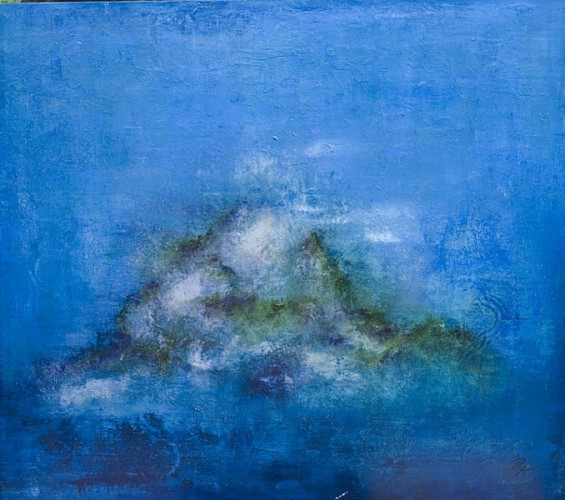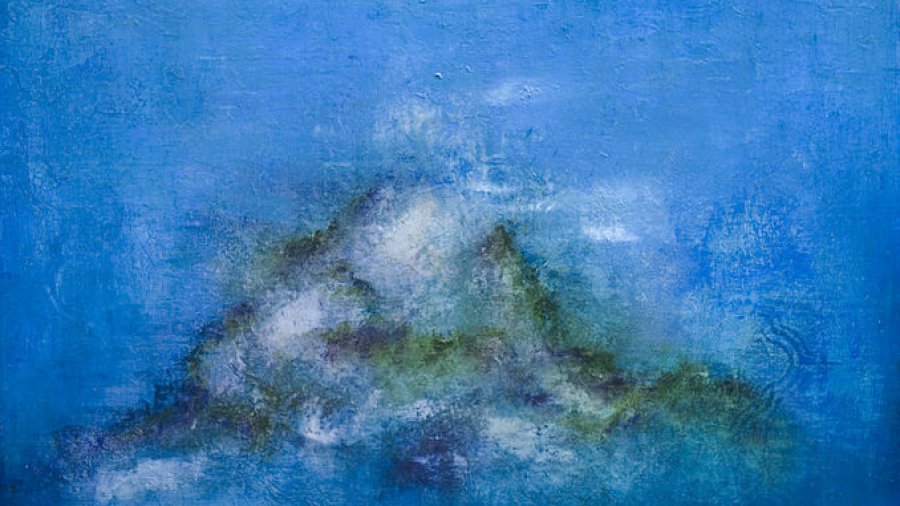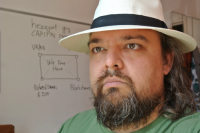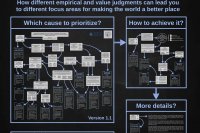“Self-censorship is insulting to the self. Timidity is a hopeless way forward.”
― Ai Weiwei
In the wake of publishing my recent piece on the sociocultural dysfunctions of the United States, a few people have criticized me. More specifically, a few Internet-folks have suggested that my emphasis on the need for change in our present global situation is problematic for various reasons.
One segment of people seems to want to suggest that all I’ve done is complain and blame and idealize without offering realistic solutions. Others seem to be saying that I must be some kind of deeply troubled individual with a “victim mentality” who resorts to demonizing his own culture instead of countenancing his personal issues. Still others seem to claim that caring about re-imagining/changing our sociocultural structures is incompatible with accepting the world as it is and finding contentment.

Exposición “Inselberg” de Rafael Torres Correa, 2011. Photo Credit: Wiki Commons
My Perspective
These three claims seem separate but also interrelated to me, and I’d like to address all of them here. With regard to the first, my perspective is that the first step in improving anything is to identify the aspects of the thing that may be problematic or dysfunctional. Once one has done that, one can begin to consider possible refinements or reforms that will render the system more effective. (It should be noted that although human concepts like “improvement” and “effectiveness” are arbitrary and always relative to an individual’s value system, there are innumerable social outcomes [e.g. violence, enslavement, poverty, starvation, homelessness, environmental destructiveness, physical/psychological disease/abuse, oppression, etc.] that most of us agree are undesirable. In the case of sociocultural systems, I would personally define “effective” as: human/animal-friendly, compassionate, open, equal, and sustainable.)
So, even if I had ended the essay having offered no solutions and having done nothing but criticize (which I didn’t do), it would still be a valuable piece, I’d argue. I feel that it is perennially necessary for individuals to speak out against the unjust, limiting, hurtful, or oppressive aspects of their societies. Throughout history, many individuals have refrained from criticizing the status quo for fear of being condemned, marginalized, imprisoned, ex-communicated, or executed. Moreover, it’s often the case that the most deeply troubled and fractured among us are the least likely to speak out against the situation in which they find themselves. For fear of the aforementioned punishments and of being reduced to convenient, dismissive labels like “person with a victim mentality” or “traitor” or “heretic,” innumerable people have eschewed any sort of resistance to the man-made structures that have dehumanized or enslaved them. In remaining silent they have implicitly consented to the problematic structures and power hierarchies in which they operate, perpetuating them through obedience. Countless people implicitly consent to the sociocultural machinery that surrounds them.
Perceiving this, I have often felt a deep, irrepressible compulsion to put words to the dysfunctions I perceive in my own culture and society—to disrupt the status quo in hopes of establishing a kinder, more open one. I reject the idea that I must, therefore, be an exceptionally “troubled” individual with a “victim mentality.” Like anyone else, I have my unique personal issues and psychological baggage, but generally I think of myself as a contented person. I conceive of words like “contentment” and “happiness” to refer to an approach—a playful, non-resistant manner, a chucklesome recognition that “this too shall pass” and that ostensibly “bad” fortune might ultimately produce something ostensibly “good” (and vice versa)—that one adopts in the face of the inevitable ebb and flow of events and internal states. I tend to view the enormous violence and injustice of our human enterprise with disgust, but I also perceive that the darker aspects of this world we’ve created are a reflection of mankind’s more brutish potentialities[1] (arguably elicited/exacerbated by the organization of our societies/social groups)—potentialities I strongly suspect we are not presently able to cease actualizing (especially given our systems of social organization). I have no illusions of utopian destinations for my own internal state or for our global situation. I see change as the only constant in this bizarre existence, and generally I just try to “go with the flow” and experience as much as possible.
So I would argue that it isn’t the case that I am an abnormally disturbed individual who just wants to blame everyone else for his issues. Acceptance and contentment are compatible with activism, I think. I’ve struggled with my particular demons and have gotten pretty good at living in my own mind. Shit’s generally fairly chill in my headspace, and I find a significant amount of meaning in my day-to-day life. But I fail to see how finding contentment and meaning in life should result in an eschewal of criticism of one’s culture/society (as some readers seem to have implied by presuming that only a deeply troubled individual would decry so many dysfunctions in his culture/society). Just because the possibility of living a “good life” isn’t precluded by one’s society doesn’t mean the system can’t be improved. As I said, I have no illusions of utopian destinations for society, and I don’t think large change happens quickly. However, I do think that every society and culture is inevitably constantly changing (just like the rest of existence), and that unless citizens take it upon themselves to be outspoken and to push for the sorts of changes that matter to them, the interests of a powerful, wealthy minority end up creating the future. I think of idealism/optimism as a means of establishing a vision of the kind of society we’d like to live in—not as an attainable goal, but as a kind of lantern to guide the small, short-term changes that are feasible and valuable. Noam Chomsky has expressed a similar sentiment:
“Optimism is a strategy for making a better future. Because unless you believe that the future can be better, you are unlikely to step up and take responsibility for making it so.”
Natural
Beyond all of the above arguments and justifications for criticizing/re-imagining one’s society, it should be noted that I can’t help but express myself. Not only do I feel it is the appropriate thing to do, but I literally feel a rumbling, inextinguishable need to communicate and externalize my inner world. It seems somehow engraved on the ineffable core of my being that I must express my deepest feelings and seek other people who love and understand me on a fundamental level. It’s as Henry David Thoreau once said:
“If a plant cannot live according to its nature, it dies; and so a man.”
If I quelled my organic urges to express my deep-down self, I would, in a sense, die. My inner world would shrink and shrivel. The Chinese artist and activist Ai Wei Wei expresses a similar idea in the quote with which I opened this piece: “Self-censorship is insulting to the self. Timidity is a hopeless way forward.”
I refuse to censor myself. I will be the silly, irreverent, ridiculous ape-thing that I am. And when I see people being restricted or dehumanized or oppressed by the sociocultural structures of my country, I will oppose those structures. I will feel that a denial of anyone’s freedom is a threat to everyone’s freedom. I will criticize any and all repressive, limiting norms and institutions and try to imagine how they could better support and nourish people and animals (and preserve the planet). I will speak my piece, softly but clearly, in my little corner of the Internet and the universe. I will do this not because I’m a coward who needs to blame someone else for his problems or because I’m a chronic complainer with no real solutions, but because dissent and dreams burst from me like trees from the dirt. I am irrevocably, unabashedly a subversive and a dreamer.
And I won’t get everything “right,” but that’s not the point. I will be true to my deepest feelings, and I will help people by showing them that there are others who feel similarly and have dealt with the same issues. That’s not a boast, either. It’s simply what art does—makes public the private world and in so doing reveals connection and sameness that would otherwise have been unrealized. I see this blog and everything I do as art and as an extension of the same basic feeling—a feeling that transparency and openness and love and uninhibited discussion are the only ways forward for all of us. I will live by that feeling and stand up for that feeling and do whatever that feeling compels me to do, regardless of those who write me off as an “alarmist” or a “crybaby” or whatever. I really don’t give a shit. There are things I need to create in this world, and I won’t stop until the reaper rings.
“Never forget that justice is what love looks like in public.”
― Cornel West
If you liked this, read the mission and follow me on Twitter.
[1] Originally, I had written of the “darker side of human nature” here, but I edited the phrase due to Jessica Clark’s nice point (see the comments) that it may be problematic to assert a universal inherent “human nature” that is extricable from the organization of one’s society/social groups. I added a couple parenthetical notes to clarify this latter point. I re-wrote the phrase to “mankind’s more brutish potentialities” because it seemed to capture more adequately what I had originally meant to express. Please read Jessica’s comment for more insight into why the global situation we’ve created is not conducive to cooperation.
About Jordan Bates
Jordan Bates is a Lover of God, healer, mentor of leaders, writer, and music maker. The best way to keep up with his work is to join nearly 7,000 people who read his Substack newsletter.





“I tend to view the enormous violence and injustice of our human enterprise with disgust, but I also perceive that the darker aspects of this world we’ve created are a reflection of (among other factors) the darker side of human nature—a side I strongly suspect we are not prepared to relinquish.” This is an interesting point you bring up. I’m not sure I can say with confidence that these darker aspects are, in fact, reflections of the darker side of “human nature” (if such a thing really exists and can be defined so simply). To me, they seem more a… Read more »
jessica, thank you for addressing this. i thought vaguely while writing that maybe simplifying what i was talking about to the phrase “darker side of human nature” might be overly reductive. as you mentioned, i think it’s undeniable that there are certain animalistic impulses of the human race that seem somehow “lower” than what we are capable of—greed, out-group discrimination, jealousy, selfishness, and aggression seem to me like impulses of which everyone is capable but which many people manage to quell/dispel, or something. i absolutely agree that the way we’ve organized our world/taught ourselves to be plays a huge role… Read more »
Cool Jordan. I had a feeling that phrase was more of a shorthand way to get to the main point than a reflection of your true feelings. I spent a couple hours yesterday going over my bookshelves and I don’t think I have any really good sources for nature vs. nuture texts. Most if my study was more focused on individual constructions of self rather than trends across broad subsets of humanity. (And it was mostly through literary rather than philosophical or psychological texts–I read a lot of literary memoir. 😉 )
Jessica, actually your comment was really timely and on-point because although I’d been using “human nature” as a shorthand for something else, I hadn’t really considered what that something else was until you pointed that out. Honing in on what I meant—everything that humans are *potentially* capable of doing—was actually a really important refinement in my thought process, I think. Thanks much for checking your library. If you have any good suggestions for literary memoir that reveals a lot about an individual constructing their identity, I’d love to hear it. 🙂
jessica, i changed that sentence somewhat and added a footnote mentioning your comment. i think it now more accurately expresses what i originally meant by “human nature” (something like: “what people are capable of, given certain circumstances”). thanks again for the great point.
<3
<3
Human nature, like human culture and human art, should be understood within the contexts of its own emergence, and in that regard, this essay is entirely on point
thanks, nick. i appreciate that point. i think i should have possibly been more specific than just saying the “darker side of human nature.” i’m going to reply to jessica and explain what i was thinking, but i’m glad this topic came up because it’s definitely a worthy one.
“unless citizens take it upon themselves to be outspoken and to push for the sorts of changes that matter to them, the interests of a powerful, wealthy minority end up creating the future.” There’s not much more that needs to be said than this. Apathy means relegating control to those who seize it. Good on you for being aware of this and voicing your discontentments with the social machine as it stands. “If I quelled my organic urges to express my deep-down self, I would, in a sense, die.” Many have died this death. Art, it is my true feeling,… Read more »
thanks for the support, emanuel. glad that we seem to have similar feelings about these issues and that they were worthwhile for you. appreciate you chiming in again in the discussion and hope to hear from you more. peace :3
Haters are gonna’ hate. You do you, JB. I, for one, have thoroughly enjoyed reading your work. Thank you for sharing your insights with us all! 🙂
All the best,
Lindsey
Thanks, Lindsey. 🙂